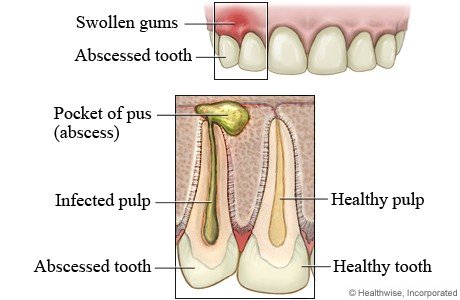What is abscessed tooth?
An abscessed tooth is a severe infection that usually shows up on the root of the tooth or between the gum and the tooth. It could become a dental emergency, as an abscessed tooth not only causes a great amount of pain, but if left untreated it can also cause serious health problems. An abscess can cause damage to the surrounding tissues, damage to the jaw bone and in some cases even affect the immune system resulting in death of the afflicted person. A number of things can cause tooth to abscess such as:
- Severe tooth decay
- Bad trauma to the tooth
- Broken or chipped teeth
- In some cases a tooth can be susceptible to infection after a crown or a filling has been put in:
- Gingivitis
- Gum disease
Symptoms of a dental abscess typically include pain, swelling and redness of mouth and face. Other signs of abscess might include cavities, gum inflammation, oral swelling, pus drainage, and difficulty in fully opening your mouth or swallowing.
Tests for dental abscess
A dentist often can determine by a clinical exams + radiographs if you have an abscess.
Treatment for a dental abscess
You should see a dentist for dental abscess treatment. Root canal therapy may need to commence to drain the infected tooth. The doctor may decide to cut open the abscess and allow the pus to drain. Unless the abscess ruptures on its own, this is usually the only way that the infection can be cured. People with dental abscesses may be prescribed pain relievers and, at the discretion of the doctor, antibiotics to fight the infection. An abscess that has extended to the floor of the mouth or to the neck requires immediate attention.
With a dental abscess, as with each and every illness, comply with your doctor’s instructions for follow-up care. Proper treatment often means reassessment, multiple visits, or referral to a specialist. Cooperate with your doctors by following instructions carefully to ensure the best possible oral health for you and your family.

